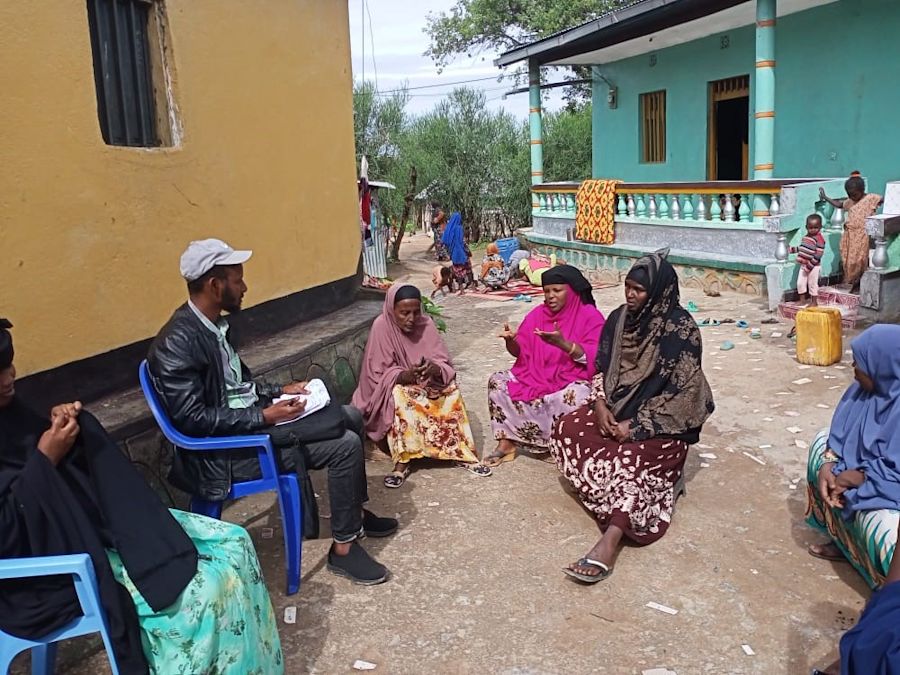
Empowering Women in Moyale: An Uphill Task
Women make up almost half the population of Moyale, a bustling market town spread across the border of Ethiopia and Kenya. Yet, they remain invisible in local political and social structures. And, even though they contribute to the economy and business activities in many ways, they have virtually no formal role in decision-making at any level.
The lack of women’s participation in socio-political and economic life is one of the major reasons why poverty remains pervasive in Moyale, with high levels of food insecurity. Access to education is minimal. Recurring droughts and ethnic tensions increase the town’s fragility as a social and economic unit. Women suffer the most in this oppressive environment and they suffer in silence.
Initiatives to empower women and give them a voice have failed to gather strength due to traditional socio-political customs which often prevent them from taking part in any sphere of public life. The well-entrenched patriarchal system subjects women to various forms of discrimination and gender-based violence. Early marriage, for instance, is a common practice. Girls also have a much higher rate of dropping out early from school. Under the customary tradition of governance, there is no room for women to be heard or consulted. A group of male elders from different ethnic groups and clans exercise political and legal powers. They make all the important decisions concerning community life and dispute resolution. This system of patriarchal cultural beliefs and practices treats girls and women as “insignificant beings” who cannot have a role or even presence in decision-making spaces. Therefore, progress towards gender equality and women empowerment in Moyale cannot be examined outside the traditional cultural setting.
Despite these hurdles, over the past few decades women have been fighting to be recognised as equal partners to their male counterparts. Though such efforts, through the support of local civil society organisations and women support groups, have borne some fruits, there is still a daunting task ahead because, in both customary and government institutions, community representation remains an exclusively male domain.
The concept of gender parity, both in private and public life, is alien to the male-dominated culture. Women have no ability to determine their own choices or exercise their natural rights and they lack the power to influence their socioeconomic privileges. Even the national laws promulgated in Kenya and Ethiopia to protect women have had little effect in this region. In fact, these laws have been perverted and actually become a tool in the hands of the traditional local elites to continue the age-old discriminatory practices.
In the face of such huge challenges, Moyale women have still been able to find the strength and courage to organise and fight for their rights. Hilack Milk Group, on the Ethiopian side of Moyale (Region 5), is an example of this struggle. For a number of years, the group has worked to bring women together to raise awareness about their right to education and helped them acquire livelihood skills, such as setting up retail shops and raising goats.
In June 2017, the Inter Africa Group (IAG) in collaboration with LPI, rolled out a cross-border cooperation initiative to enhance the skills of grassroots civil society organisations like Hilack Milk, and enable them to participate and contribute in policymaking spaces. The project benefited Hilack Milk—and other civil society organisations in Moyale—as it motivated them to collaborate and share the knowledge they had acquired whilst working with other small-scale women’s groups like Migo and Dubo, and this in turn helped them develop a bigger network.
Unfortunately, the progress made by Hilack Milk was cut short due to the 2018 conflict between the Somali Region (5) and Oromia Region (4). During the fighting, the group was targeted and it lost property and resources worth 120,000 Ethiopian Birr. A retail shop run by women associated with the group was burnt down, 60 goats were looted, and the group was left with few resources to continue its work. The onset of the Covid-19 pandemic in early 2020 further aggravated the situation as many of the group’s remaining activities also came to a halt. The group is now struggling to maintain its existence and its participation in the ongoing cross-border collaboration project may help the group continue to survive.
Most recent blog posts
2026-01-13
Placing Local Voices at the Centre of Regional Peacekeeping ConversationsA Reflection from the Horn Dialogue Series IV